Fri 17 June 09:00
-
09:00 - 09:45 Oper - Probebühne 2
Clean Coaching
Warm-upWith her short, practice-oriented mind-up, coach and former dancer Rivca Rubin gives an introduction to the fundamental principles of the conversational and therapy method ‘Clean Coaching’ that conveys a basic attitude towards coping with communication and problem-solving suitable for everyday life. As a tool box for individual, systematic and goal-oriented communication, this method assists in opening up new perspectives and making efficient decisions. It strengthens people’s motivation, self-confidence and resilience in the frame of creative processes and also in daily life.
Warm-up
Rivca Rubin (UK) trainer, coach
-
09:00 - 09:45 Oper - Großer Ballettsaal
Dance and Gyrotonic
Warm-up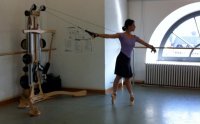
This warm-up combines dance and Gyrotonic in a productive way. The movement system Gyrotonic trains the body’s energy, dynamics, length, movability, and flexibility – all the qualities dancers require to perform a broad range of movements. In addition, Gyrotonic raises the awareness and the sensitivity of one’s own body. The focus of the workshop is on different exercises to train the mobility and stability of the hips and the flexibility of the torso, thus substantially contributing to a better understanding of the structure and principles of one’s own body.
Please bring your yoga mat
Mónica García Vicente (DE) dancer, gyrotonic trainer
Fri 17 June 10:00
-
10:00 - 10:15 Oper - Bühne
Welcome
Sabine Gehm (DE) Direction Dance Congress 2016
Katharina von Wilcke (DE) Direction Dance Congress 2016 -
10:15 - 11:15 Oper - Bühne
How did you get together?
How can we live together in our splintered world – in both space and time, as contemporaries, who simultaneously enjoy different times? 'How did you come together?', a member of the audience asked the dancers during the initial discussion of Xavier Le Roy's 'Low Pieces'. 'By train', the participating Christine de Smedt laconically responded: As if togetherness only existed, when no reason for it can be counted as given.
The lecture focuses on the mode of belonging, of community in contemporary dance. A mode that does not presuppose a pre-existing plural, but instead engages with its irredeemability in that the 'we' will have been always already a temporary construction: In order to hold together what is divided in artistic work processes and unconditionally welcome the other – in the precise fuzziness of parallel worlds to which we belong in such a peculiar way.Lecture
In German with simultaneous translationKrassimira Kruschkova (BG/AT) Dance and Performance scholar, curator
Fri 17 June 11:00
-
11:00 - 18:00 Oper - Physioraum
Transition Dance and what else?
What comes after one's career in dance? Besides a conversation on this topic, the Stiftung TAN Z – Transition Centre Germany offers freelance and permanently employed dancers comprehensive advice on making the transition from an active dance career to a subsequent profession.
During the Dance Congress, Heike Scharpff, certified psychologist and project head of the foundation, offers dancers individual, free and confidential consultation on their professional future. Issues can include bureaucratic information, one's own acquired competences or questions related to the next steps on one's individual professional path. The consultation can be continued after the Congress – personally, by phone or via Skype.Registration for 45-minute consultation appointments at
Heike Scharpff (DE) psychologist, project head of Stiftung TANZ – Transition Zentrum Deutschland
-
11:30 - 12:00 Oper - Bühne
On Bodies, Borders, and Movement: Moving through contested space
Borders influence and structure the daily lives and work processes of artists. Concretely observable phenomena like tightened visa procedures or a rising number of travel bans seem in staggering contradiction with an internationally acclaimed rhetoric of 'cultural exchange'. In response to this, one can describe on an immaterial level an increase in national and other identitarian, borders, but also borders within artistic disciplines in a globalized arts market. The introductory lecture is based on an understanding of borders in their performativity, as porous, mutable and dynamic structures rather than rigid and immobile lines of separation: How can choreography be understood as a tool for analysing and creating artistic as well as societal and political participation and intervention? What role can art, and the body play in these myriad textures of measuring out, negotiating, legitimising and claiming material and immaterial spaces?
Introductory lecture
In English with simultaneous translationSandra Noeth (DE) cultural theorist, dramaturge
-
11:30 - 12:45 Künstlerhaus - Kino
Reclaiming the Critical Space
The subversive body, as it was once demanded by the prominent Indian choreographer Chandralekha, is endangered. India's contemporary dance scene has indeed evolved rapidly in the past 20 years, but while up to a decade ago themes such as 'discovering one's own tradition' or the question of the relationship between tradition and modernity dominated the debates, young dance professionals today are mainly attempting to secure a place in the country's capitalist-oriented society. Contemporary dance increasingly is shaped by a culture of dance labs, camps, workshops, and master classes that always already provide the context for the development of new creations and leave little freedom for the thematic interests of the choreographers involved. The fact that even dance practitioners are now attempting to institutionalize contemporary dance should be regarded skeptically.
Following a short presentation of their own works, choreographer Preethi Athreya, dramaturge Pravin Kannanur, and filmmaker Vijay Boothalingam will discuss the situation of dance professionals in India from a practical and theoretical point of view.Lecture presentation, Discussion
also:
Workshop Working with Gestures
Fri 17 June, 15:30 - 17:00, Schauspiel - Probebühne
Preethi Athreya (IN) choreographer, dancer
Vijay Boothalingam (IN/AU) filmmaker, video artist
Pravin Kannanur (IN) dramaturge, visual artist -
11:30 - 13:30 Künstlerhaus - Jo-Jo Saal
Zeit-Genoss*innen
Contemporary witnesses in dance
 © Susanne Foellmer
© Susanne FoellmerIn the reconstruction processes of historical dance performances, questioning contemporary witnesses plays a special role, because their presence at the time vouches for particular credibility. But every memory has gaps. Former dancers often recall only parts of a choreography since, as participants on stage, they were not able to grasp the piece as a whole. Or they are today no longer able to again dance the past choreography for purely physical reasons.
The object of memory, then, is always also characterized by forgetting and the impossibility of complete rendition. In the light of such losses, questions arise as to what and how contemporary witnesses can relate, and in which relationship recollections stand with other performance fragments such as photos, video recordings, or sketches. Based on artistic and scientific perspectives and the discussion of project materials including 'undo, redo and repeat' (Christina Ciupke/Anna Till) and 'The Source Code' (Jochen Roller), the 'value' of oral and physical accounts of past dance knowledge given by former contemporaries is examined.presentation, working-group
Christina Ciupke (DE) choreographer, performer
Susanne Foellmer (DE) dance scholar
Sabine Huschka (DE) theatre and dance scholar
Jochen Roller (DE) choreographer, performer, dramaturge
Irene Sieben (DE) author, dance pedagogue
Anna Till (DE) choreographer, dancer -
11:30 - 14:30 Oper - Probebühne 2
Reality check and dream machine
Learning and teaching in contemporary artistic education
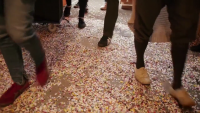 © Renen Itzhaki
© Renen ItzhakiStudents and teachers of the Hochschulübergreifendes Zentrum Tanz (HZT – Inter-University Centre for Dance) Berlin discuss with colleagues of other educational institutions the preconditions and goals, the ideals and realities of university training in dance, choreography, and performance. How can dance, choreography, and performance be learned and taught today? How do individual interests and institutional guidelines as well as theory and practice relate to each other in artistic studies at universities? In which way do art universities feel responsible for their teachers, students, and local environments?
The discussions take place within the frame of a workshop, which will be accompanied by two artistic actions: In the happening 'Collecting points', experienced coaches navigate Congress participants through the practice and project work, the contexts and modules of studying contemporary, experimental dance and choreography. The initiative 'Artist's Pledge' assists young artists in subsisting after their studies and in formulating their own artistic and ethical projects.Workshop, Artistic action
Florian Feigl (DE) artist, lecturer HZT Berlin
Eva-Maria Hoerster (DE) project coordinator HZT
Renen Itzhaki (IL) student HZT
Julek Kreutzer (DE) freelance artist, pedagogue, graduate HZT
Kareth Schaffer (DE) freelance artist, graduate HZT
Fri 17 June 12:00
-
12:00 - 13:00 Oper - Bühne
Exposed. Ethics of bodies in aesthetics
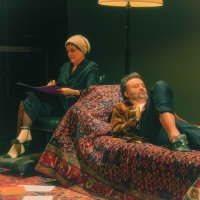 © Grenz_film, wiener kulturstätten
© Grenz_film, wiener kulturstättenOne body is no body, because bodies exist only in relation to other bodies – singular plural.
We are misled, if we do not conceive bodies as a common field, but isolated from each other. We produce a dilemma worldwide, if we do not take them seriously as a form of being-together. Aren’t bodies always already exposed in a global structure to which they, meaning all of us, physically belong? If the life of a body does not end on the surface of its physical form, then the question is: Where do its living borders reveal themselves? This problem is dialogically addressed by Susanne Valerie Granzer and Arno Böhler in their lecture. An indication of a possible answer to this question is provided by the stage. It is a place where the exposure of bodies is visualised. Their vulnerability, arising from the fact that we always already stand before the gaze of others. And thus before the call to be mindful of, spare, and respect others. Such an ‘ethical imperative’ is not abstract but situational. It refers to actually existing bodies that share a common world. Therefore, it is at the same time both ethical and aesthetic – an affect of compassion.Dialogical lecture
In German with simultaneous translationArno Böhler (AT) philosopher
Susanne Valerie Granzer (AT) actress, philosopher
Fri 17 June 13:00
-
13:15 - 13:45 Oper - Kleiner Ballettsaal & Schauspiel - Probebühne
Physical Explorations
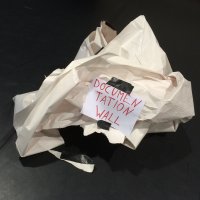
During the lunch break, interested persons and movement-hungry Congress participants are cordially invited to physically test historical and contemporary training approaches in dance. Students of the master study course Contemporary Dance Education, MA CoDE, at the Frankfurt University of Music and Performing Arts (HfMD K) give practical insights into techniques of Ausdruckstanz, modern dance, and other historical and contemporary styles, as well as hybrid forms of different practices. Beyond a traditional, linear understanding of history and a mainly didactical orientation, open approaches to passing on enable a playful engagement with movement and dance.
Physical Workshop (2 parallel)
with Veronica Garzon, Oper – Kleiner Ballettsaal
Through rhythmical and choreographic structures we will build the class 'Expressing – Exposing Gestural Movement' based on gestures, walking patterns, isolations and sequential articulation, influenced and inspired by the concepts of modern jazz and the works of Jerome Robbins and Bob Fosse. Assuming certain conventions from different folk dances and putting them in relation with several concepts of contemporary dance today, we will explore new possibilities for actualization of these dances, allowing the participants through sensory experience a better understanding of the significance and relevance of these dances in the history of contemporary dance.
with Julia Kathriner, Schauspiel – Probebühne
This physical exploration is about the memory of dance knowledge, referring to and being inspired by Jean Cébrons/Jooss-Leeder method. From this historical perspective we will work with weight, power, and rhythm as ordering principles. Along diagonals we will explore paths through space and search for links to contemporary dance.as well as:
Sat 18 June, 13:15 - 13:45
with Ilana Reynolds, Oper – Kleiner Ballettsaal
with Leonardo Rodrigues, Schauspiel – ProbebühneSon 19 June, 13:15 - 13:45
with Katarzyna Ustowska, Oper – Großer Ballettsaal
with Britta Schönbrunn, Cumberlandsche BühneVerónica Garzón (ES), Julia Kathriner (CH), Ilana Reynolds (US), Leonardo Rodrigues (BR), Britta Schönbrunn (DE), Katarzyna Ustowska (PL) dancers, students MA CoDE
Ingo Diehl (DE) professor MA CoDE
Susanne Triebel (DE) coordinator, teacher MA CoDE
Fri 17 June 14:00
-
14:00 - 15:00 Schauspiel - Bühne
The physicality and performativity of bordering processes
Impulse © Khaled Jarrar
© Khaled Jarrar'Home is not where you were born; home is where all your attempts to escape cease.' (Naguib Mahfouz)
In their dialog, theatre scholar Kristin Flade and artist Khaled Jarrar react on mass movements and the movements of the mass that we can observe in situations of crises and conflict. They explore the physicality and performativity of bordering processes, and ask: What kind of knowledge and tools do movement and physical experience provide in order to understand, represent, legitimize, challenge, rehearse and aestheticize borders? How do presence and effect, discipline, empathy and sensing come into play and how are they used and displayed in bordering processes? How is identity physically created, rehearsed, recognized and destructed?In English with simultaneous translation
as well as:
Workshop
Sat 18 June, 14:00 – 16:30, Oper - Probebühne 2Kristin Flade (DE) theatre scholar, author
Khaled Jarrar (PS) filmmaker, artist -
14:00 - 16:00 Cumberlandsche Bühne
Love and labour
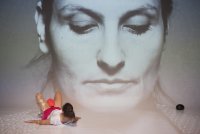 © Miha Fras
© Miha FrasTwo formats supplementing each other delve into the connections between love and labour: In the performance ‘Made with Love’ created in Ljubljana in 2015, the author Teja Reba deals with the subject of unpaid labor of mothers and artists. As a mother and performance artist, Teja Reba holds two social roles whose value as true work is not always acknowledged and for which the factor of ‘love’ still counts as compensatory currency and motivation. In ‘Made with Love’, she and her family reflect on the similarities and differences between these two roles in public and private perception.
Afterwards, Teja Reba and the philosophers Bojana Kunst, and Renata Salecl will talk with the performance artist Janez Janša about the question of what remains of life, when precariousness becomes the normal state of affairs. A special focus is placed on love as the ‘fuel’ for a precarious existence, in which the individual is willing to pursue low-paid or unpaid labour.Performance, Talk
In English and Slovenian with English surtitlesMade with Love
With Teja Reba, Loup Abramovici, Ava Nuria Abramovici, Bela Su Abramovici, Eduardo RaonAuthor, choreographer Teja Reba
Dramaturge Suzana Koncut
Sound design, original music Eduardo Raon
Visuals and lighting design Meta Grgurevič and Jaša
lighting design and technical supervision Igor Remeta
photographer Nada Žgank
Production manager, executive producer Tina DobnikProduced by maska
Co-financed by the Ministry of Culture of the Republic of Slovenia and Ljubljana MunicipalityTalk
Janez Janša (SI) artist, author, director
Bojana Kunst (DE/SI) philosopher, performance theorist
Teja Reba (SI) author, choreographer
Renata Salecl (SI) philosopher, sociologist
Fri 17 June 15:00
-
15:00 - 17:00 Künstlerhaus - Kino
Contemporientalism: Contesting the orientalism in contemporary curation
At the European world fairs in the first half of the 20th century, it was extremely popular to exhibit indigenous dancers as examples of ‘the Other’ and expose them to the gaze of the spectators. The simultaneous development of innovative dance techniques reflected this notion of the ‘Other’, as did the conviction of modern Orientalism that a strict distinction must be made between categories such as art and folklore, theatre and ritual, contemporary and traditional. The event suggests that these models of European modernism based on mutual exclusivity are present until today in global, contemporary performance practices and curatorial decisions. Based on the examples of a German and a Korean curatorial project, it is to be discussed which orientalist patterns of thought stemming from the past continue to determine the process of curating and thus the programming of international festivals.
Discussion
Jee-Ae Lim (KR) dancer, curator
Helly Minarti (UK) dance scholar, curator, author
Anna Wagner (DE) dance curator
Eike Wittrock (DE) dance scholar, dance historian, curator -
15:00 - 18:00 Oper - Kleiner Ballettsaal
Look closer until you touch it
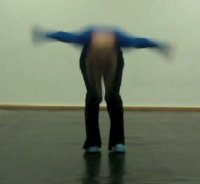 © Andrea Krohn
© Andrea KrohnThe connection between human visual perception and the production of movement sequence material is the field of research of the Body Mind Centering (Bmc) teacher Adriana Almeida Pees. In a workshop, different somatic practices are tested that are based on the mutual relationships between the sense of vision and movement. To be examined are which sensory pro- cesses within human perception are interconnected and how they influence individual dance practices. In a subsequent lec- ture performance, the dancer and choreographer Andrea Krohn will present her research on the significance of eye movements for choreographic practice. The following discussion with participants will be accompanied by live video images of the Brazilian photographer Alice Dalgalarrondo.
Physical workshop, Lecture performance, Talk
Registration required
Please bring comfortable clothesAdriana Almeida Pees (DE) teacher, dancer
Alice Dalgalarrondo (BR) photographer, video artist
Andrea Krohn (DE) choreographer, dancer -
15:30 - 16:30 Schauspiel - Bühne
Performing borders: Vulnerability, citizenship, and the body
ImpulseIn this encounter, cultural sociologist Gurur Ertem and artist Tom Tlalim bring the discussion to the proposition that our bodies are themselves sites of power. Tlalim looks at how we learn, memorize, and enact in our subject-citizenship in both body and voice: Through moving, exploring and bringing our body into action we can access and evoke memories that otherwise would not have been available, and thus partake in the creation of the state apparatus in a different way. Ertem focuses on vulnerability in dance, underscoring its ethical and political salience. In her reading, vulnerability entails openness to being affected and affecting, as a basis for learning, empathy, connection, and community. It is through vulnerability as a process of exposure to the unfamiliar, uncontrollable, and uncomfortable that one can extend oneself beyond oneself, renouncing barriers.
In English with simultaneous translation
as well as:
Workshop
Sat 18 June, 13:00 – 15:30, Oper - Großer Ballettsaal
Gurur Ertem (TR) cultural sociologist, curator
Tom Tlalim (UK) researcher, sound artist -
15:30 - 17:00 Schauspiel - Probebühne
Working with gestures - Movement, Mataphor, and Meaning
The science of gestures or 'mudras' in all classical Indian dance forms has its origins in the Natya Shastra, a treatise which sets out the rules of how these gestures are executed and in what contexts they communicate meaning. It is arguable that the treatise has several authors, who often wrote from
their observation of how forms were evolving. At its best, the rules are descriptive, rather than prescriptive.
In resonance with an idea of contemporaneity as a dynamic, responsive and ever-changing framework reacting on its times and conditions, this physical workshop treats the idea of gesture as an open-ended form rather than a tool to create meaning. It distances the relation between gesture and word to create
multiple meanings and non-meaning as well.
Physical workshop
Registration required
Please bring comfortable clothesas well as:
Presentation Reclaiming the Critical Space
Fri 17 June, 11:30 - 12:45, Künstlerhaus - Kino
Preethi Athreya (IN) choreographer, dancer
Fri 17 June 16:00
-
16:00 - 18:00 Oper - Großer Ballettsaal
Inner Suspension
The now 70-year-old choreographer Susanne Linke unites diverse experiences with the history of german dance. Prominent personalities of dance such as Mary Wigman, Dore Hoyer, Kurt Jooss, and Hans Züllig have shaped Susanne Linke’s unique movement memory, from which she has developed a very own, highly structured technique. Together with fellow travelers, colleagues, students of the Folkwang University of the Arts, and dance historians, Susanne Linke is working within the frame of the research project ‘Inner Suspension’ on the documentation of her specific artistic approach that is to be conveyed to future generations and set in relation to contemporary concepts of art. In a lecture demonstration, a group of selected dancers under the direction of Susanne Linke will present the training model ‘inner suspension.’
Lecture demonstration
Henrietta Horn (DE) choreographer, dancer
Waltraut Körver (DE) dramaturge
Susanne Linke (DE) choreographer
Bettina Stöß (DE) photographer
Luiza Braz Batista (BR), Rossella Canciello (IT), Héloïse Fournier (FR), Mareike Franz (DE), Elisabetta Rosso (IT), Armelle van Eecloo (FR) dancers -
16:00 - 18:00
Let's talk about work, honey!
Part I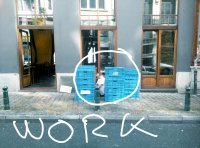 © Claudia Bosse
© Claudia BosseFor her three-part salon 'Let's talk about work, honey!', the choreographer Claudia Bosse invited practitioners from different artistic disciplines to joint work sessions. Choreographers meet filmmakers and dramaturges meet performers in an installative setting to examine similarities and differences between their specific working methods based on not yet completed works. The incomplete works are set in relation to each other to discuss the paradigms of contemporary art-making practice in various socio-political contexts. Under what conditions is art produced today, or more specifically, how do the conditions of production in countries such as Germany and Austria differ from those in Egypt and Greece? Which structures must be resisted on a transnational level? And is a political moment of contemporary choreography revealed in this potential resistance?
Salon, Workshop
as well as:
Sat 18 June, 14:00 – 16:00 Part II
Sat 18 June, 17:00 – 19:00 Part IIIKaya Behkalam (DE/EG) filmmaker, artist (instead of Doa Aly)
Claudia Bosse (DE) artist, choreographer
Anna Etteldorf (AT) project coordinator
Ismail Fayed (EG) author, scholar
Adania Shibli (PS/DE) author (instead of Tzeni Argyriou)
Filippos Tsitsopoulos (GR) artist
Arkadi Zaides (IL) choreographer -
16:45 - 18:15 Künstlerhaus - Jo-Jo Saal
Choreography and cosmology
What scenarios and designs – what cosmologies – emerge, when choreography is not understood as working with and on what exists, but as speculation about what is possible? At issue is less the escape to illusionary worlds or the abandoment of that which is materially given, but the question of which forms of relations, e.g., between subject and object, human and non-human, material and immaterial, can be articulated in dance and performance. in a talk, choreographic techniques of ‘world-making’ are negotiated and linked with questions from various fields of knowledge, such as cosmology, animism, neo- materialism, or multi-naturalism. The discussion is conceived as a ‘séance’, a speculative and discursive experiment in which the playing cards are to repeatedly trigger new thoughts and put them on unusual tracks.
Discussion
Stefan Apostolou-Hölscher (DE) theatre scholar
Gerko Egert (DE) theatre scholar
Maximilian Haas (DE) cultural scholar, dramaturge
Bojana Kunst (SI/DE) philosopher, performance theorist
Martina Ruhsam (AT) choreographer, performer, author -
16:45 - 18:15 Oper - Probebühne 2
The bodies we are
Antje Velsinger’s choreographic work on the utopian potential of bodies starts from the assumption that every person has a number of different bodies: physical, social, political and other bodies that undergo change and are constantly updated and mobilized. The choreographer imagines the body as a specific archive in which various memories, emotions and practices are stored.
In an exchange with the choreographers Jenny Beyer and Josep Caballero García, Antje Velsinger discusses the utopian moment of this open, process-oriented concept of the body and gives insights into her choreographic research conducted in the frame of the post-graduate programme ‘Performing Citizenship’.Lecture demonstration, Talk
Jenny Beyer (DE) choreographer, dancer
Lea Moro (CH) choreographer, dancer (instead of Josep Caballero García)
Antje Velsinger (DE) performer, chroreographer
Fri 17 June 17:00
-
17:00 - 18:00 Kunstverein
Sassafras, Cypress & Indigo - Black Screen Images and the (E)Motive Notion of Freakiness
In her performance lecture 'Sassafras, Cypress & Indigo – Black Screen Images and the (e)motive Notion of Freakiness', the American queer icon Vaginal Davis takes stock of her life as an intersexual performer, composer, painter and writer – a life in which everyday life, art, representation and irony have been merging for decades. At the Kunstverein Hannover, Vaginal
Davis, who paints pictures with make-up, shoots films, teaches and curates, reflects upon role mechanisms and constraints in a time characterised by (self-)display and the omnipresent exposure of the private. Who defines the categories of male/female, who makes whom an insider or outsider?Performance lecture
In the context of the international exhibition project 'Bodies and Stages' at the
Kunstverein HannoverVaginal Davis (US/DE) Künstlerin
Durational
-
Theaterhof
Ausdruck-Mobil
 © MS Schrittmacher
© MS SchrittmacherThe choreographer Martin Stiefermann and his company MS Schrittmacher have been searching for traces of more than 30 Ausdruckstanz-dancers from the 1920s, 1930s, and 1940s. The ‘Ausdruck-Mobil’ gives the congress participants information on where the today often unknown dancers ended up after fleeing from the national socialists, and which paths they took while emigrating. the caravan designed by MS Schrittmacher features an extremely haptic reconstruction of the flight routes as well as tables, information material, videos, sound installations, and an animated online presentation showing which artistic inspirations the Ausdrucktanz dancers spread throughout the world and the influences they later brought back to Germany. Interesting information can be printed out in the ‘Ausdruck-mobil’, sent by email upon request, or gained directly on site from the research team.
Installation, research, choreography Martin Stiefermann
Dancers in the videos Brit Rodemund, Efrat Stempler, Johanna Lemke
Sound design Albrecht Ziepert
Video Willi Neumann
Digital illustration Carolin Schultz
Research assistants Antje Maria Lossin, Alisa Beckstein
Editing, text work Hartmut SchreweAn installation by MS Schrittmacher. Produced in the frame of the Festival POST – Ausdruckstanz in Israel, Deutschland und im Butoh at Dock 11 Berlin 2015. Funded by the Capital Cultural Fund and supported by 50 Jahre Deutschland Israel
-
Künstlerhaus
Books on the move
Bookstore on the road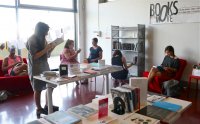 © Stephanie Pichon
© Stephanie PichonGuest of the Dance Congress: the mobile bookstore for everyone who dances, reflects and moves. The assortment of this international bookstore for contemporary dance and performance includes books on choreography, applied anatomy and body experience, as well as theoretical essays and biographies in German, English and French. New publications are on offer as well as hard-to-find books on contemporary dance.
Agnès Benoit (FR) dancer
Stéphanie Pichon (FR) journalist -
Kunstverein
Bodies and Stages
The international exhibition project ‘Bodies and stages‘ at the Kunstverein Hannover casts an associative view to the intersections of performance, dance and fine art. With installations and performances, the artists Alexandra Bachzetsis, Vaginal Davis, Adam Linder, and Shahryar Nashat explore various ways of presenting the body in space. Displays, filmic works and live interventions question how people present themselves to others and which poses they strike in daily life and in the frame of artistic (self-)staging. How do we present ourselves to the other, to the outside world? What does self-presentation mean in an exhibition context or on the stage? The artistic approach to these questions quite naturally crosses the borders between the arts.
11. Juni – 28. August 2016
Opening hours
Tue – Sat, 12:00 – 19:00
Sun, 11:00 – 19:00
Kunstverein HannoverAdmission free for congress participants
Guided tours
Fr 17. Juni, 15:00 – 16:00
Kathleen Rahn director Kunstverein HannoverSo 19. Juni, 14:00 – 15:00
Regular guided tourSo 19. Juni, 15:00 – 16:00
Dialogführung dialogic tour
Jörg Mannes ballet director Staatsoper Hannover
Kathleen Rahn director Kunstverein HannoverFunded by German Federal Cultural Foundation, Stiftung Niedersachsen, Ministry for Science and Culture of Lower Saxony, State Capital Hannover and Pro Helvetia/Schweizer Kulturstiftung.
-
Künstlerhaus
Transition - Dance of Life
PhotoexhibitionKarine Seneca stands all alone on the huge black stage. This is a scene from the rehearsals for 'Madame Bovary' at the Staatsoper Hannover. She finished her career as a ballet dancer playing the role of Emma Bovary. The time for her last premiere, the last dance in Hanover and her very last performance had come. 'A lonesome moment', says Karine about the moment the curtain fell for the last time.
For the then 40-year-old, this was a time filled with great tension, the pressure to achieve and great expectations, but also with her own feelings of farewell, insecurity and reorientation. She began her career as a member of the Basler Ballett at the age of 17. After performing with the Deutsche Oper am Rhein, the Züricher Ballett and the Boston Ballet, she went to Hanover in 2008. But a lot has changed. The steps have become more difficult, the joints are worn. Pain that will never cease again. A guest performance in Heilbronn brings the season to an end, and with it dancing on pointe for Karine Seneca. The abrupt end of a career in the middle years of one’s life. How does it feel when one’s entire life consists of dance that now comes to an end?
The photographer Insa Cathérine Hagemann accompanied the ballet dancer Karine Seneca for a period of two years (from 2012 to 2014), from the rehearsals for her last leading role back to her hometown of Cannes. A selection of these highly personal portraits is on view at the Künstlerhaus during the course of the Dance Congress 2016.Insa Hagemann (DE) photographer
Transition - dance of life from Insa Cathérine Hagemann on Vimeo.